Paris-Roubaix: 10 conclusions from the Hell of the North
The Van der Poel-Van Aert rivalry, a triumph for the outsiders, 'junior racing', new tech, and more from Paris-Roubaix
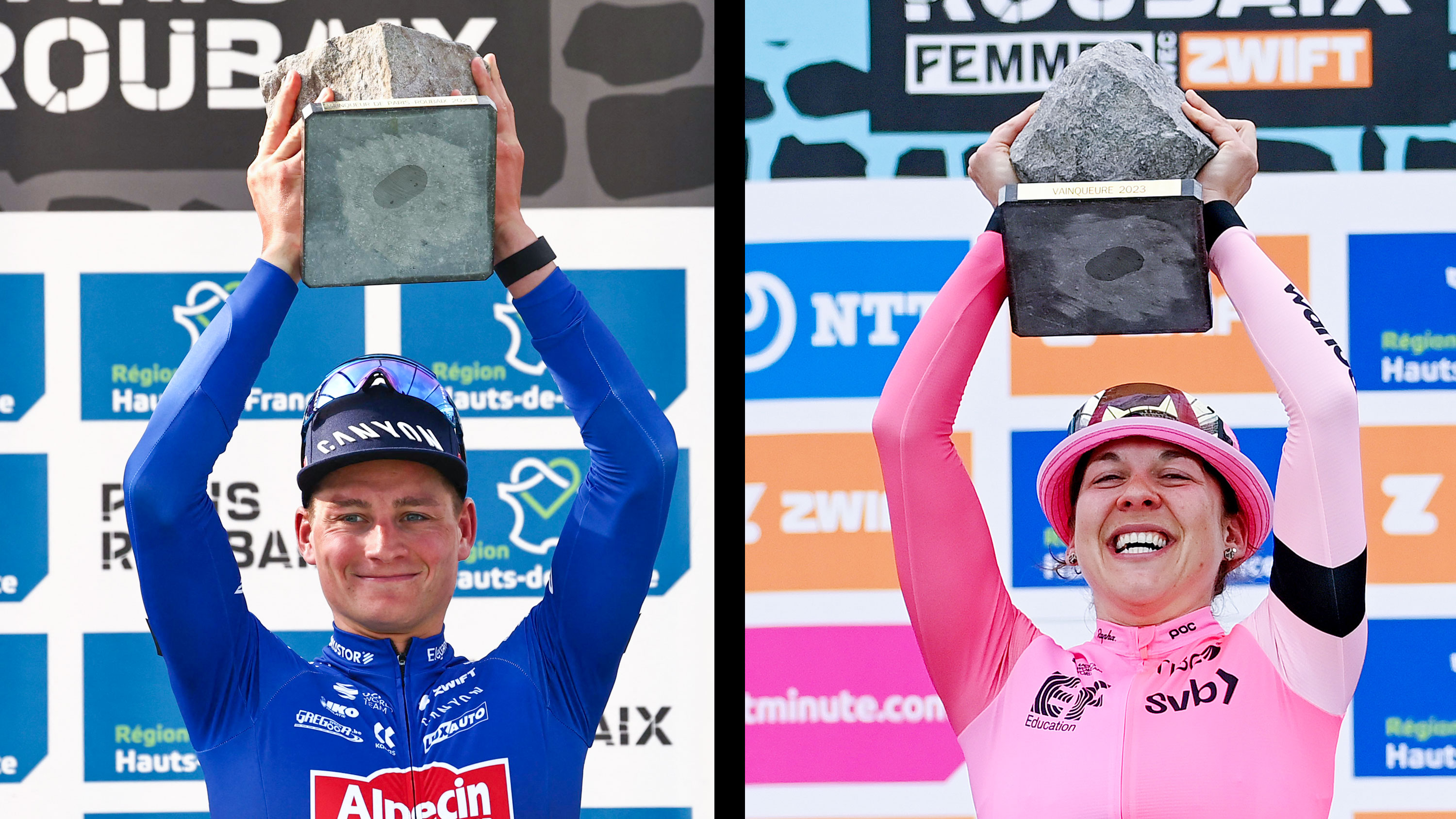
A thrilling set of races at Paris-Roubaix and Paris-Roubaix Femmes avec Zwift drew the cobbled Classics to a close at the weekend, the Monuments run over the brutal cobbles of northern France providing the same mix of tension, excitement, and drama as they do year after year.
In the men's race, it was Mathieu van der Poel (Alpecin-Deceuninck) who hoisted the famous cobblestone trophy above his head in the Roubaix velodrome at the third time of asking after completing the quickest-ever edition of 120 on Sunday afternoon.
A day earlier, a huge effort from the early breakaway – along with some misfortune from the chase behind – saw Alison Jackson (EF Education-Tibco-SVB) celebrate victory in trademark style. The 34-year-old prevailed from a group of breakaway survivors in a velodrome sprint to become the first-ever Canadian rider to win the race.
But there was far more to the races than the identity of the winners. Every rider has a story to tell after Paris-Roubaix, so the oft-repeated saying goes, and there was plenty to tell over the combined nine hours of thrilling action this weekend.
Of course, we can't cover all of those stories here at Cyclingnews, but our on-the-ground team of Daniel Ostanek and Peter Stuart have put their heads together with women's editor Kirsten Frattini to summarise the talking points from both races.
There's more to come from Paris-Roubaix, including Fabian Cancellara's final column of the cobbled Classics season and our tech roundups, too. But first, here are our 10 conclusions from the men's and women's Paris-Roubaix.
Paris-Roubaix never disappoints
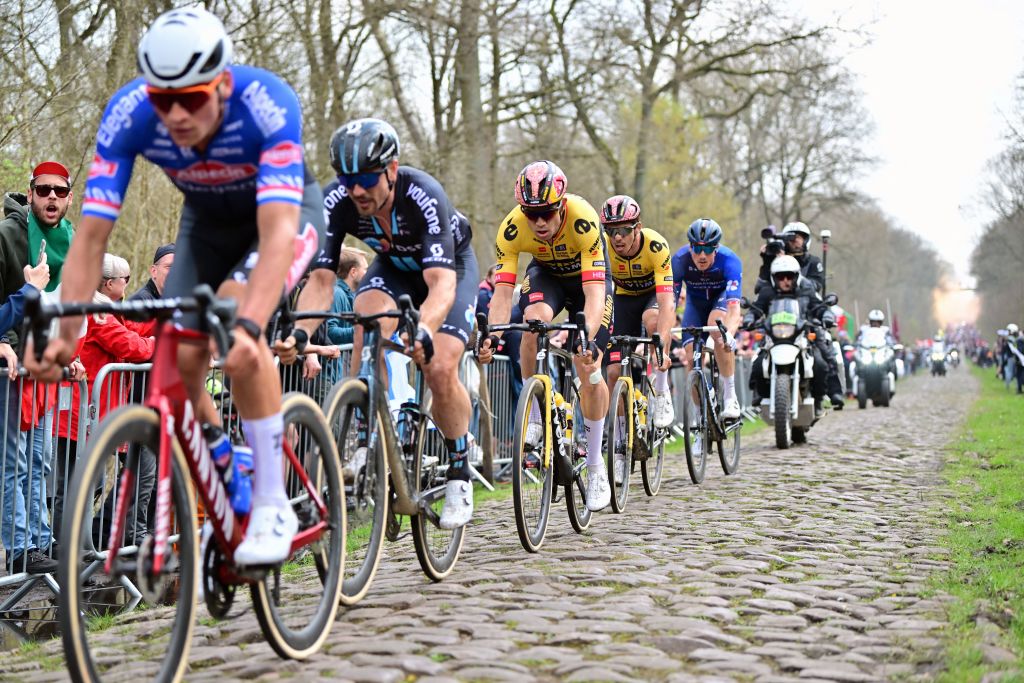
As the culmination of the cobbled Classics season and the highlight of the spring racing season – along with the Tour of Flanders, of course – Paris-Roubaix occupies an outsized position in the cycling calendar.
The latest race content, interviews, features, reviews and expert buying guides, direct to your inbox!
With that reputation comes an expectation for action and excitement that, somehow, never manages to weigh the race down. Can anyone think of a real 'dud' at the Hell of the North? There certainly wasn't one this weekend.
In the women's race, there was tension throughout as the breakaway gained a massive advantage on the road to the cobbles before an elite group of favourites struck out, aiming to make it to the front of the race.
A mid-race pileup in the chase threatened to put a dampener on proceedings, but with the chase quickly back on, the run to Roubaix pivoted around the 'will they, won't they' question of whether the break could actually do it.
In the end, Alison Jackson took a well-deserved win, having done more than her fair share of work on the front of the move, and drawing to a close the most hectic edition yet of the women's race. She also cemented herself as the first Canadian to win Hell of the North.
Over in the men's race, the drama began on the first cobbled sector of the race and barely let up thereafter. As was the case on Saturday, crashes had a major effect on the race, while Wout van Aert kicked off the attacking among the favourites early, at a mammoth 103km from Roubaix.
The carnage in the Arenberg, Mathieu van der Poel's repeated attacks, and the drama of Degenkolb's crash and Van Aert's puncture all contributed to what was one of the most action-packed editions of the race in recent years.
It's a shame, then, that we have to wait almost a year for the next Paris-Roubaix weekend. (DO)
Another thrilling chapter in the Van der Poel-Van Aert rivalry
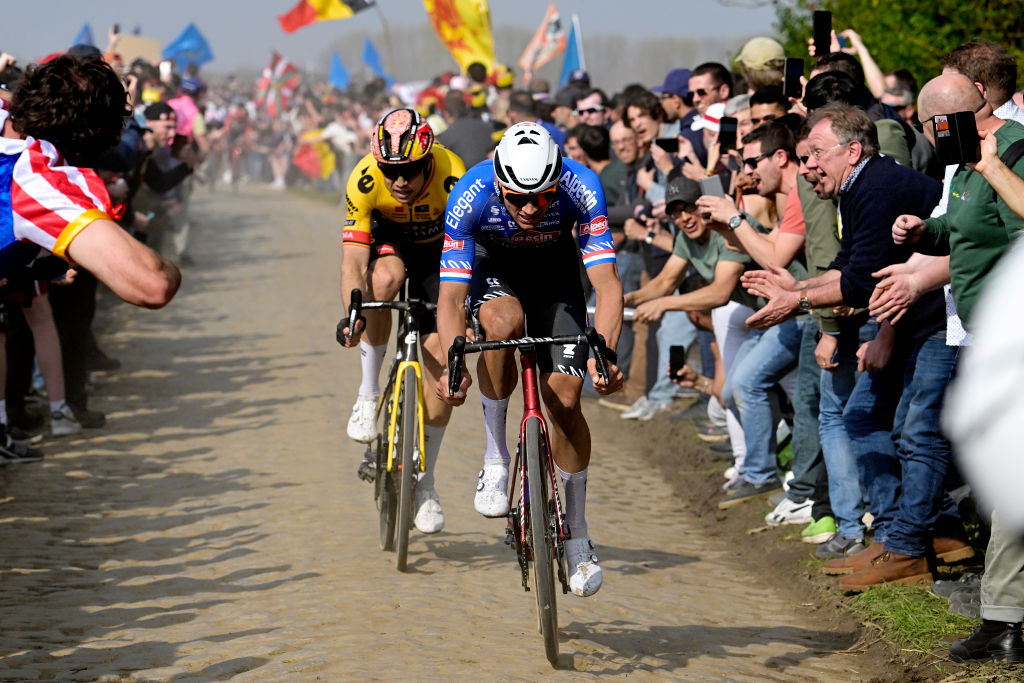
Having raced each other in both road and cyclocross for over a decade, Mathieu van der Poel and Wout van Aert have enjoyed countless duels for wins – from local junior cyclocross races to the biggest Monuments in road cycling.
This spring has brought yet another chapter in the career-long rivalry between the pair, with Milan-San Remo, the E3 Saxo Classic, the Tour of Flanders, and Paris-Roubaix all playing host to the latest battles in what has been a cycling war which brings to mind those of Merckx vs De Vlaeminck or Boonen vs Cancellara.
Through the first three of those races, Van der Poel had enjoyed the upper hand, escaping to glory on the Poggio as Van Aert took third and then dropping the Belgian at Flanders before finishing second to Tadej Pogačar.
Van Aert struck a blow of his own at E3, sprinting to the win in a clash of the 'big three' titans, but at Paris-Roubaix, he was again second-best of the pair on the results sheet.
Of course, it was through no fault of his own that he couldn't battle Van der Poel for the win. A cruel puncture exiting Carrefour de l'Arbre robbed us all of witnessing what could've been an iconic Paris-Roubaix final 15km.
Instead, Van der Poel powered away on his own, and there were no mind games, no attacks, no cat-and-mouse track stands, and no velodrome sprint.
Between Van Aert's initial push 103km out at Haveluy à Wallers and his decisive acceleration at Carrefour de l'Arbre and Van der Poel's surging attacks at Auchy à Bersée, Mons-en-Pévèle, and Pont-Thibault à Ennevelin, Paris-Roubaix hosted another epic battle between the pair.
Sunday delivered a classic edition of the Hell of the North, but there is a tinge of regret that Van Aert's puncture denied the race a final battle to go down in history. (DO)
Outsiders prevail at women's race
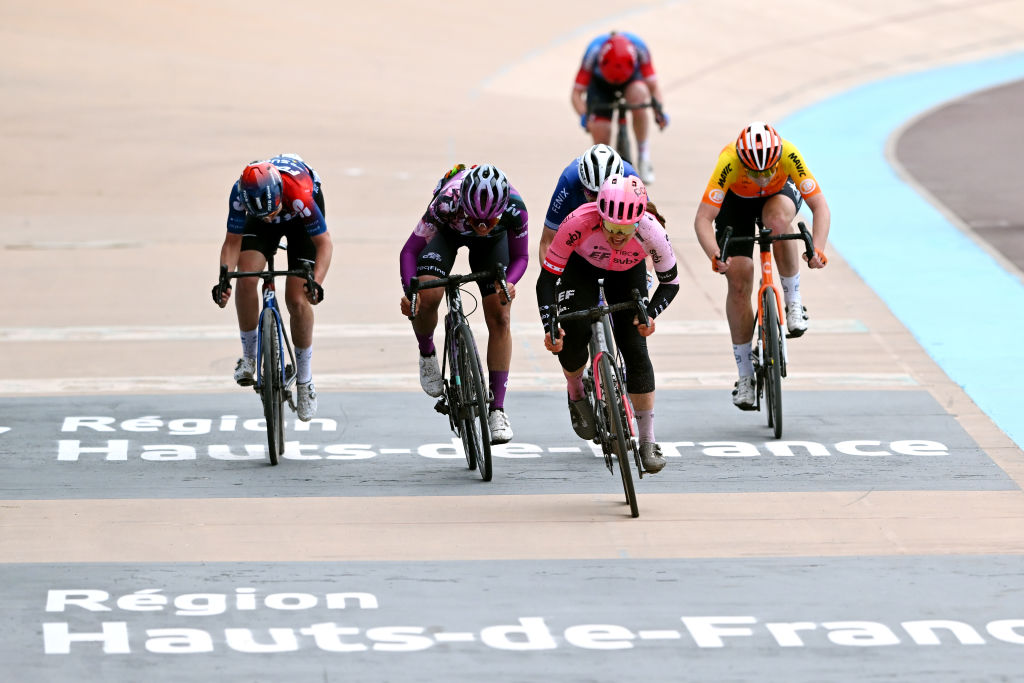
Few would have predicted that, among the 142 riders who set out for the 145km ride from Denain on Saturday morning, it would EF's veteran Alison Jackson raising her hands in Roubaix almost four hours later.
Even fewer would've named Liv's Katia Ragusa and Fenix-Deceuninck rider Marthe Truyen as candidates for the podium at the biggest race of the spring season.
Outsiders and breakaways surviving to score the win has been a classic – if rare – feature of the men's race, with Dirk Demol and Mathew Hayman two prominent examples. Now, the women's race has its first example of such a triumph.
None of the podium trio, who had fought their way into the early breakaway inside the first 15km, were the leaders of their respective teams, with Zoe Bäckstedt (46th at the finish), Valerie Demey (100th), and Sanne Cant (DNF) instead making little impact on the race.
As always at Paris-Roubaix, the element of luck turned to the benefit of those who contested the victory, with the elite group of riders chasing them going down in a mass crash at 39km to go on the Pont-Thibault à Ennevelin cobbled sector.
The treachery of the cobbles is a major part of the race, however, with riders often citing the benefits of being out in the break as a method of avoiding the carnage of the peloton.
In the end, the podium trio and three other survivors from the break made it to the finish just 12 seconds up on Lotte Kopecky, Marianne Vos and the other main favourites. It was a tenacious ride to hold off a catch that once looked inevitable, capture that famous cobblestone trophy and block out the podium.
"In my mind, for sure, I took it easy in the first kilometres," Ragusa said later. "Kilometre by kilometre, it became a feeling that I could do something big. This morning at the start, I couldn't imagine that I would come second." (DO)
Bad luck strikes the men's race
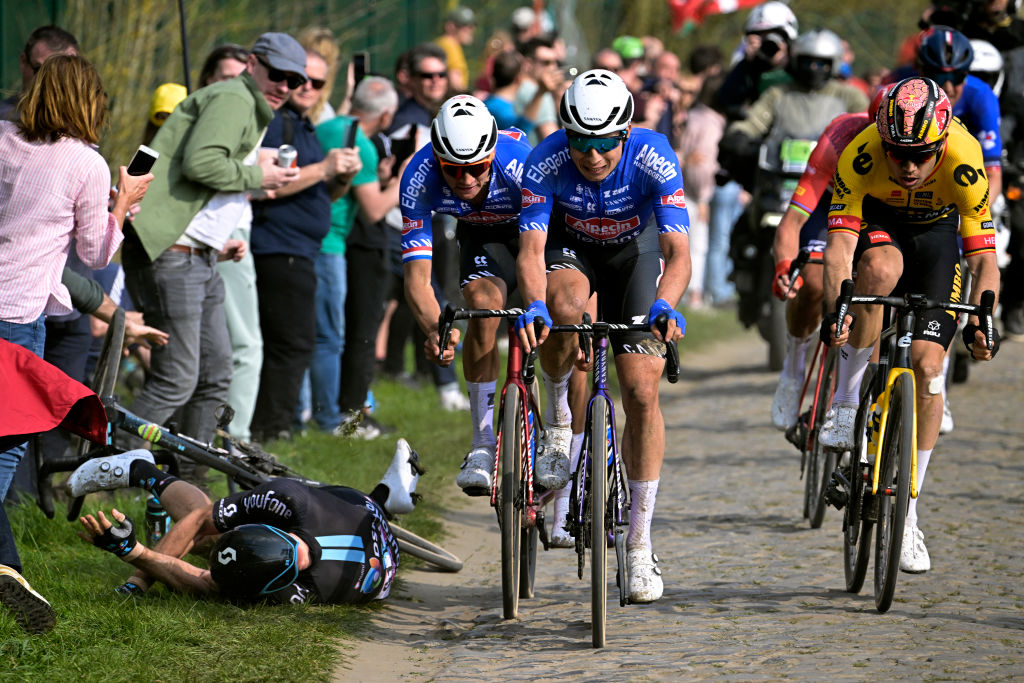
Riders often say that you make your own luck at Paris-Roubaix. Earlier in the week, Kasper Asgreen told Cyclingnews that "Bad luck always seems to find the same riders" at the race.
Whether that's true or not, and Asgreen and his Soudal-QuickStep teammates did not enjoy the luckiest day out, the crashes and punctures of Paris-Roubaix came as they always do. A brutal run through the Arenberg was notable in leaving its mark on the peloton, with favourites Dylan van Baarle and Fred Wright among those caught in the carnage.
There was no denying, however, that the final stretch of the race brought with it two race-altering instances of luck, or the lack of it. The final decisive cobbled sector of the race at Carrefour de l'Arbre saw John Degenkolb crash out of contention, while moments later, Wout van Aert fell victim to a puncture at just about the worst moment possible.
Through no fault of their own, the chance at glory was gone, and with it went hopes of a thrilling finale in the Roubaix velodrome.
The two dropping out of contention through no fault of their own brought to mind the travails of Stijn Vandenbergh and Zdenek Stybar on the same stretch of cobbles a decade ago, the QuickStep pair losing contact with the leading group after colliding with spectators.
Some may say you make your own luck at Paris-Roubaix, but it's hard to argue that was the case for Degenkolb and Van Aert on Sunday. (DO)
Tech not the deciding factor on the cobbles
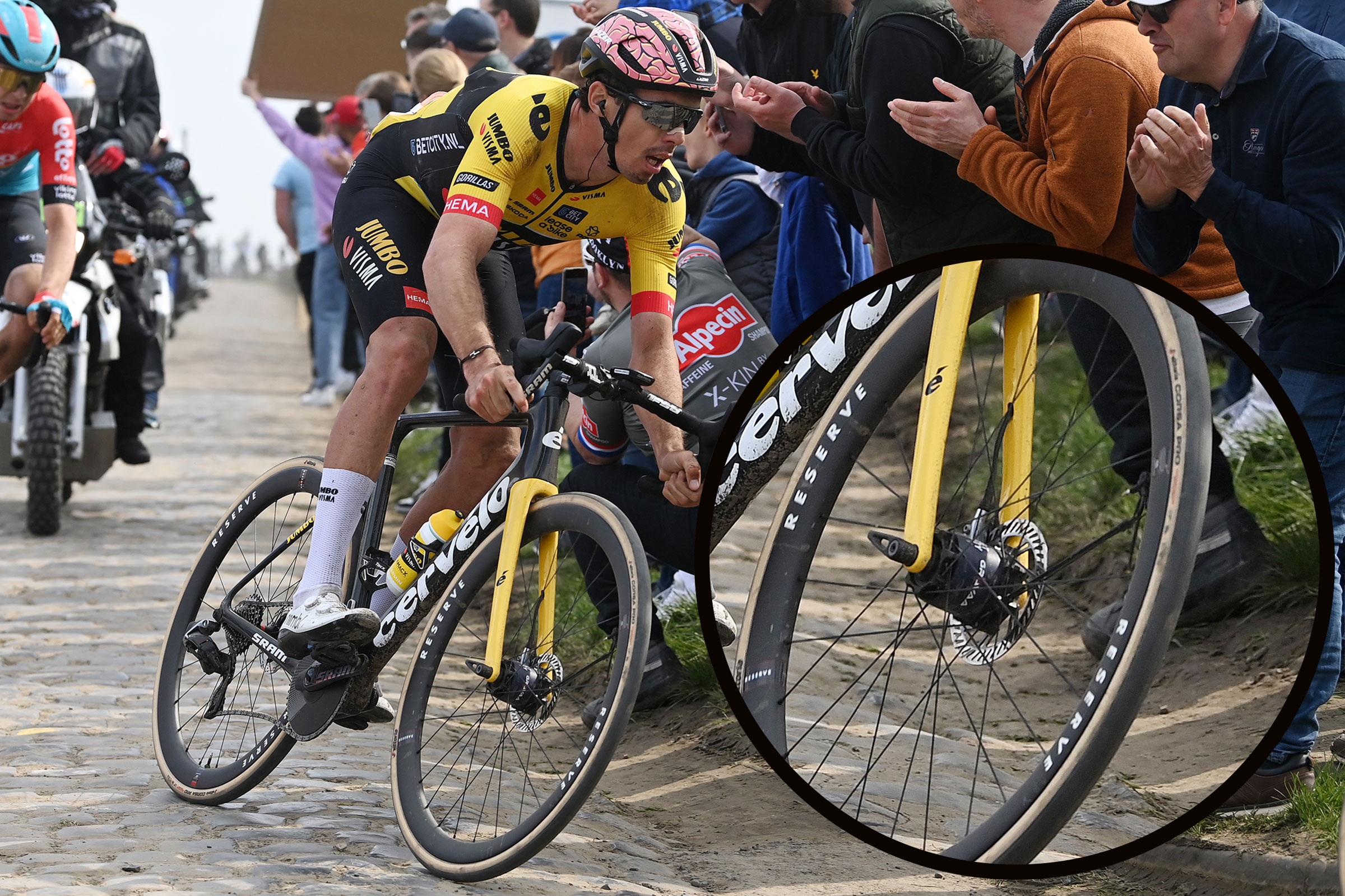
Paris-Roubaix was once a smorgasbord of technological experimentation - with innovative suspension systems, wheels, tyres and frame designs all aiming to give riders a critical advantage on the savage cobbled sectors.
This year it was exciting to see one of the most exciting technological innovations for years – with adjustable tyre pressure systems which were able to increase or reduce tyre pressure to match the terrain in real-time in the race.
Jumbo-Visma and Team DSM squads at the men's race on Sunday used rival systems. Nils Eekhoff and Pavel Bittner used the Scope Atmoz tyre adjustment system for Team DSM, while Dylan van Baarle, Christophe Laporte and Edoardo Affini all used the Gravaa KAPS system for Jumbo-Visma.
None of the riders finished in the top rankings of the race, and worse yet Christophe Laporte suffered a flat on the Trouee d’Arenberg, with a lengthy wheel change likely not helped by the technical complications of the Gravaa system.
Asked in the press conference by Cyclingnews whether the tyre tech played a part in losing Laporte from the leading group, Wout van Aert dismissed the suggestion, saying, "It's exactly the same tyre. Just different wheels." In the case of Team DSM, the reality was different, as Scope’s system can’t work with sealant, so the tubeless tyres had to run dry – a big risk on the cobbles.
While we may diminish the potential of technology, it's worth remembering that even tubeless tyres were altogether new tech in Paris-Roubaix only several years ago. All three top finishers this year, though, were riding Vittoria Corsa Pro cotton and graphene tyres, in what appeared to be a tubeless setup (judging from valve nuts on their valve stems). Conversely, both Fred Wright and breakaway rider Derek Gee saw their tubeless tyres detach from their wheels in the Arenberg forest.
While there are a few steps forwards and a few steps back, a glance at the tech choices of the fastest riders in the race proves that new tech is slowly winning the game. So perhaps adjustable tyres will still have their day. (PS)
No winners in Trek-Segafredo vs SD Worx battle
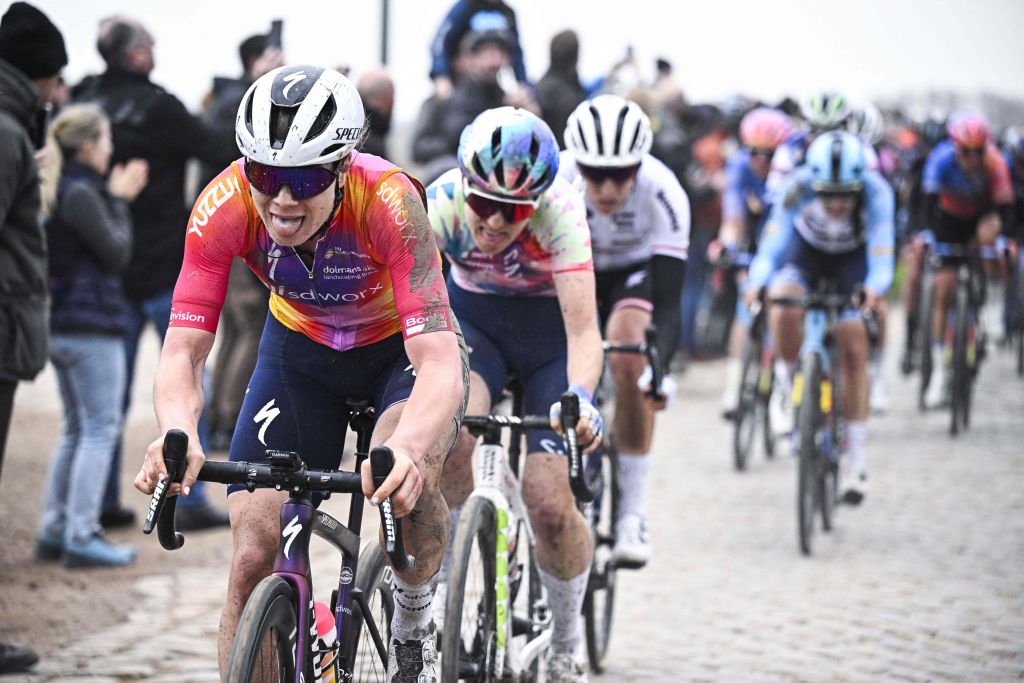
Pre-race discussion in the lead-in to the third edition of Paris-Roubaix Femmes on Saturday was centred on which streak would be broken in the Roubaix velodrome that afternoon.
Would Trek-Segafredo's record of two wins from two races continue via Elisa Longo Borghini, Lucinda Brand, or Elisa Balsamo? Or would SD Worx continue their 2023 Classics domination with Lotte Kopecky or Lorena Wiebes?
In the end, neither of the two 'super teams' lining up at the start in Denain would come out victorious at the end of the race. At various points, the chances of the win were on, then off, then on again, then off again, with the break given a huge six-minute head start at the first cobbled sector before it was down to 2:20 and falling at the time of the race-changing crash 37km out.
Both teams would mount a comeback on the run to Roubaix, with Brand and Longo Borghini leading the chase with Kopecky also in the group. Their efforts weren't quite enough, though, even if they got within sight of the break on the long, straight road toward the finish.
Both teams did have a woman in that winning move, though Trek's Lisa Klein was suffering an illness and dropped before the final, while SD Worx's Femke Markus crashed out of contention on the velodrome.
"That's Paris-Roubaix. You can predict nothing," Kopecky said after the race, having once again missed the chance at a Flanders-Roubaix double.
Brand, meanwhile, said her team were happy with their efforts throughout the day – "It wasn't easy, and I mean we still won the first two editions. We tried to win the third one. It didn't work, but we did what we could so we can't blame ourselves." (DO)
'Junior racing' leads to quickest-ever Paris-Roubaix
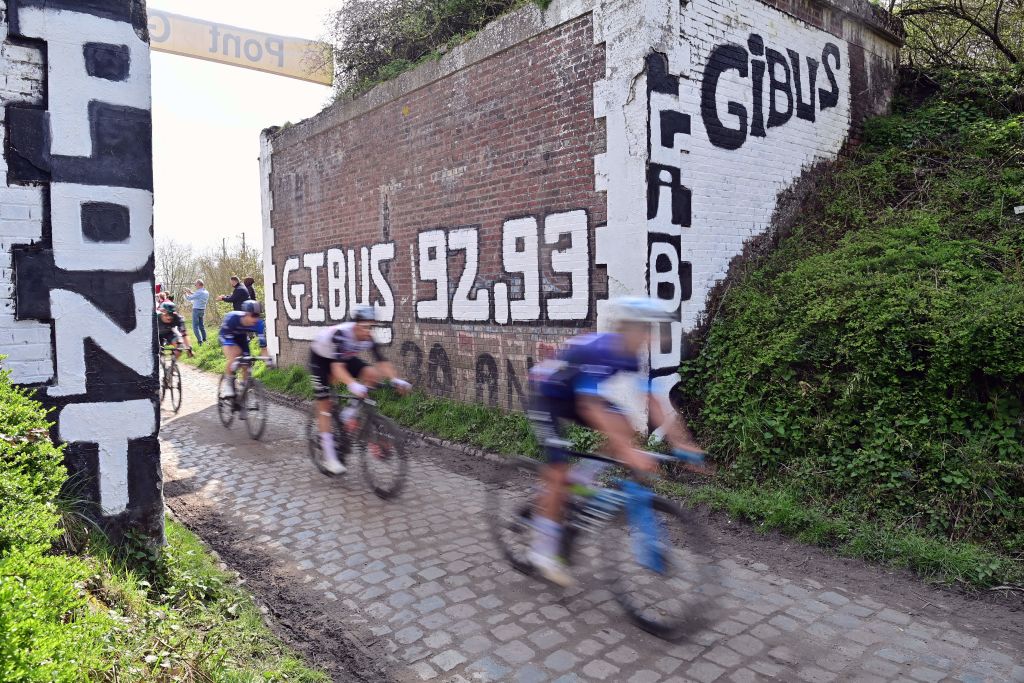
The spring Classics have flown by – literally. After Mathieu van der Poel won the second-quickest edition of Milan-San Remo with a tailwind-assisted race up the Poggio, Tadej Pogačar triumphed at the quickest-ever Tour of Flanders, racing to glory at a shade over 44kph.
Sunday also brought the fastest edition of Paris-Roubaix on record, with Van der Poel coming to the finish in Roubaix four minutes ahead of the quickest time schedule, having averaged 46.841kph over the preceding 256.6km.
The race was run at top speed almost from the very start in Compiègne as attacks flew for kilometre after kilometre before the breakaway was finally established after 85km of hard racing.
Despite multiple crashes on the early cobbled sectors, the pace barely let up from then on, with the break never enjoying a lead greater than a minute or so, while the big favourites also made their moves early, with Wout van Aert launching what proved to be the decisive split at 103km and two-and-a-half hours from the finish.
In his post-race press conference, Van der Poel said that "We just raced like juniors from start to finish." It played into his hands, he added, noting that a hard race is better for him later on.
"It's strange – we've seen in the last years that we just go all out from the beginning to the end. I think it was the fastest edition today – I don't know for sure, but it was incredible."
With the best riders in the peloton looking to make an impact, or even make the winning move, far from the finish line in the biggest races of the spring, this trend of spectacular, frantic, and fast racing doesn't look like stopping anytime soon. (DO)
'Never give up' – Vos comes back from disaster
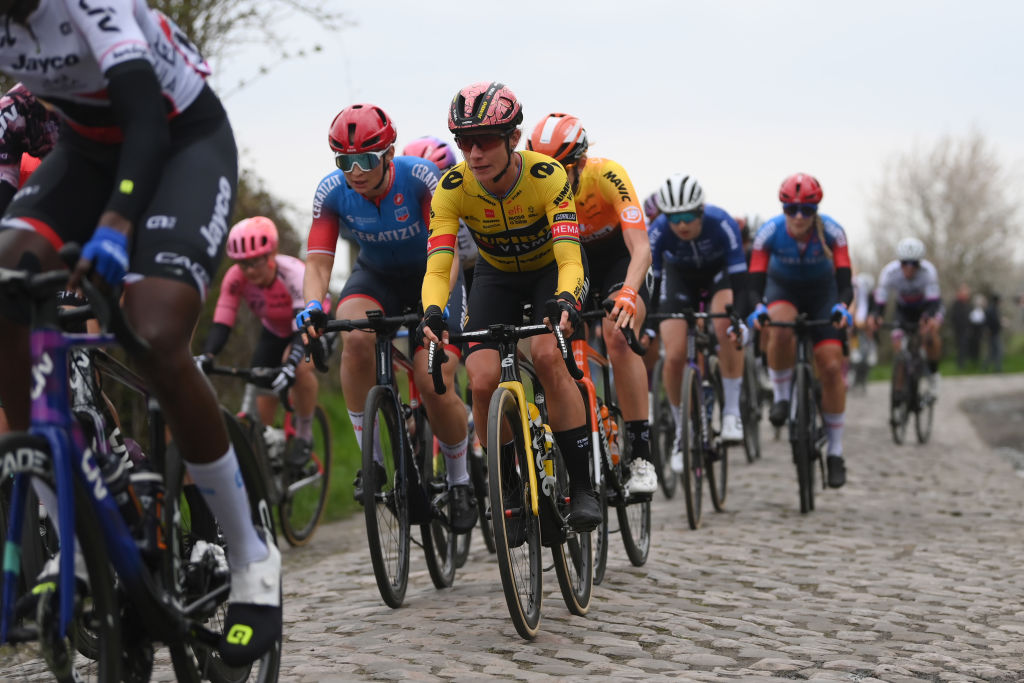
Marianne Vos was one of the favourites coming into Paris-Roubaix Femmes, but an early-race crash and a puncture appeared to render her out of contention before the first cobbled sector.
The four-star Hornaing à Wandignies was the longest of the 17 at the race at 3.7km long and came just 42km in, but as Paris-Roubaix consistently reveals, nothing is either lost or won until the race is over.
Up the road, a break of 18 riders had already built a five-minute lead as the peloton struggled to contain the gap. But as the race went up the road, Vos found herself in the unfortunate position of having to chase twice after a crash and then a puncture.
As the live broadcast footage panned across the race situation from the breakaway to the multiple chase groups, one thing remained consistent, Vos' skilful chase and never-give-up approach to getting herself back into contention.
Leaping from group to group, as the race upfront either fell apart due to crashes and fatigue, Vos somehow made the junction to the first chase group of favourites just as they bore down on what was left of the original breakaway.
They didn't end up closing the gap, and Alison Jackson went on to win the breakaway sprint, but Vos finished in the chase-group sprint that arrived just 12 seconds back.
It may not have been the result she had hoped for at the start of the race, but Vos' performance shows how much one can achieve with remarkable strength and skill and a never-give-up approach to Paris-Roubaix. (KF)
Soudal-QuickStep turn towards the Ardennes once again

Soudal-QuickStep have won more cobbled Classics than any other team around, with six editions of Paris-Roubaix and eight of the Tour of Flanders among the Belgian squad's glittering spring palmarès.
However, this year they find themselves once again turning to the Ardennes Classics and the pairing of Remco Evenepoel and Julian Alaphilippe to 'save' their Classics season. Last year, Fabio Jakobsen's early Kuurne-Brussel-Kuurne win was some consolation for missing the top results at the biggest cobbled races.
This time around, Tim Merlier's Nokere Koerse win and Yves Lampaert's E3 Saxo Classic podium were the top results.
The pair were the best Soudal-QuickStep finishers on Sunday, crossing the line in 23rd and 24th place after a punishing day which saw co-leaders Kasper Asgreen and Florian Sénéchal fall victim to crashes and punctures.
It was the team's worst result at the race since 2011, but even without success on the cobbles, they have still enjoyed more wins than anyone bar Jumbo-Visma in 2023 so far.
Two weeks lie between Roubaix and Liège-Bastogne-Liège, where Evenepoel memorably soloed to the win last year. Perhaps with those memories in mind, team boss Patrick Lefevere said outside the velodrome on Sunday, "I hope the best is yet to come." (DO)
Paris-Roubaix Femmes has the unpredictability factor
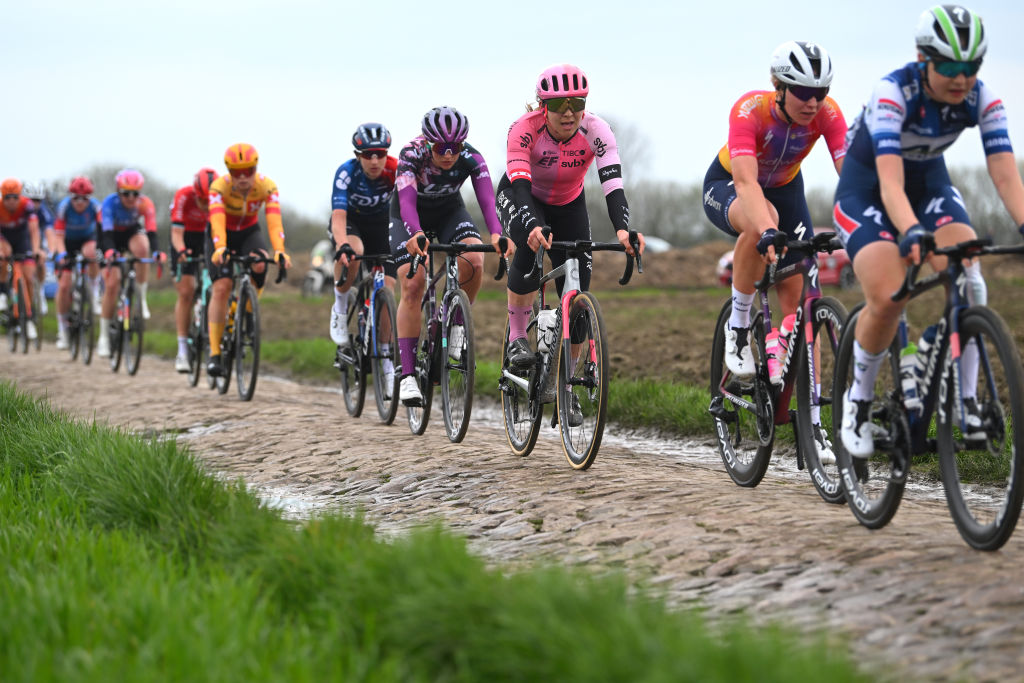
After two years of the Paris-Roubaix Femmes, the race had returned two fairly predictable winners in the shape of Trek-Segafredo duo Elizabeth Deignan and Elisa Longo Borghini. The pair soloed home in classic Paris-Roubaix fashion, even if the Italian's move at Templeuve was a more typical Paris-Roubaix move by the side of Deignan's monster 81km solo, which took in every cobbled sector.
That script was totally flipped on Saturday, however. The expected showdown between the US team and Dutch powerhouse SD Worx never materialised as the break hung on to the velodrome and contested the win among themselves.
Paris-Roubaix is, historically, a race that can be won in many ways – from long solos to select groups doing battle in the final kilometres to larger group sprints. Breakaways, too, can sometimes score the win, though the prospect of a move doing so in modern times is vanishingly small.
It won't happen every year, of course, but the fact that the breakaway survived to the end, having moved clear at 15km to go, showed that Paris-Roubaix Femmes isn't going to be a race where the strongest rider will punch clear a long way from the finish.
The first two editions of the race were ground-breaking and historic, as well as enjoyable races in their own right. But the 2023 edition was the best yet, action-packed, tense, and unpredictable. (DO)

Peter Stuart has been the editor of Cyclingnews since March 2022, overseeing editorial output across all of Cyclingnews' digital touchpoints.
Before joining Cyclingnews, Peter was the digital editor of Rouleur magazine. Starting life as a freelance feature writer, with bylines in The Times and The Telegraph, he first entered cycling journalism in 2012, joining Cyclist magazine as staff writer. Peter has a background as an international rower, representing Great Britain at Under-23 level and at the Junior Rowing World Championships.